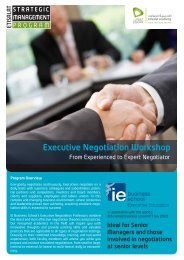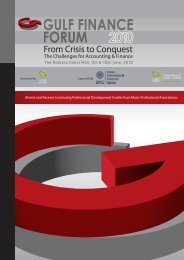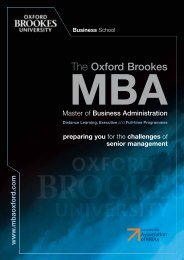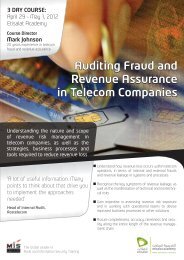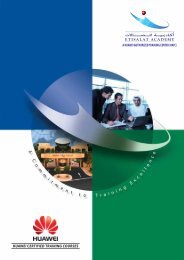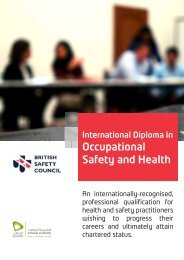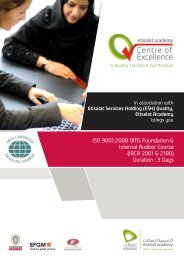Change Management v1.3 - Etisalat Academy
Change Management v1.3 - Etisalat Academy
Change Management v1.3 - Etisalat Academy
Create successful ePaper yourself
Turn your PDF publications into a flip-book with our unique Google optimized e-Paper software.
ETISALAT<br />
S T R A T E G I C<br />
MANAGEMENT<br />
P R O G R A M<br />
<strong>Change</strong> <strong>Management</strong> Workshop<br />
Minding <strong>Change</strong> & Changing Minds<br />
Program Overview<br />
Everything is subject to a constant evolving process.<br />
Markets, products and technology change. As change<br />
becomes cumulative, the systems they affect become<br />
more complex, while uncertainty increases, resulting in a<br />
decline in productivity and commitment for those in the<br />
trench-lines. The outcome: assured losses in resources,<br />
both economic and human, and an immense likelihood of<br />
adding to the alarming rate of failure that accompanies<br />
change processes.<br />
It is therefore evident that the single most important core<br />
competency to develop today, both for organizations and<br />
the executives who manage them, is to learn how to<br />
consistently and effectively manage the emotional and<br />
rational aspects of change and the positive implications<br />
change processes can offer their organizations.<br />
In association with the world’s<br />
8th ranked business school (FT Jan 2012)<br />
For Decision<br />
Makers &<br />
Implementers of<br />
new initiatives
<strong>Change</strong> <strong>Management</strong> Workshop<br />
Minding <strong>Change</strong> & Changing Minds<br />
IE Business School’s <strong>Change</strong> <strong>Management</strong> Workshop<br />
offers an in-depth view of the step-by step<br />
process: conceptual, disruptive, theoretical, practical<br />
and finally, tactical approaches to change, as well as,<br />
the holistic frameworks needed to understand how<br />
the process of change affects the core pillars of<br />
organizational strategic management: capital, talent<br />
and technology, and how firms can learn to harness<br />
them to obtain their given business objectives.<br />
Program Objectives<br />
This hands-on international executive program is<br />
designed to provide a clear understanding of the<br />
capabilities needed to address the strategic and<br />
tactical aspects of change, and the business<br />
processes required to undertake them. The result: a<br />
learning organization ready to master its competitive<br />
edge.<br />
Throughout this program you will develop a sound<br />
understanding of how to:<br />
• Assess your personal readiness towards change<br />
management capabilities.<br />
• Discover the main barriers that may derail your<br />
organization during change processes.<br />
• Identify the change anti-values and barriers that<br />
could prevent you from obtaining the best return<br />
for your organization.<br />
• Gear up your leadership skills as a change process<br />
agent and leader.<br />
• Acquire disruptive thinking techniques, for you<br />
and your team, to create and promote change.<br />
• Determine the resources needed for any organizational<br />
change project.<br />
• Differentiate among the different types of change<br />
required to reinforce and accelerate the path<br />
towards competitive advantage.<br />
Program Content<br />
Understanding the philosophical structure of change<br />
These sessions will explain how change often has<br />
external drivers and forces that can be detected,<br />
corrected and/or rebalanced with the use of organizational<br />
resources.<br />
Grasping the conceptual structure of change During<br />
these sessions diagnostic tools, source selection<br />
processes, indicator identification and strategic analysis<br />
will be presented to foresee difficulties in change<br />
processes.<br />
Guiding your organization through change processes<br />
<strong>Change</strong> does not necessarily imply revolution. Understanding<br />
change as a part of life is required to prepare<br />
organizations to adequately affront adaptive<br />
changes and shifts. The ability to correct the ship’s<br />
course aoffers a distinctive cost-effective driver.<br />
+971 4 264 4444 | info@etac.ae | www.etac.ae
<strong>Change</strong> <strong>Management</strong> Workshop<br />
Minding <strong>Change</strong> & Changing Minds<br />
<strong>Change</strong> management:<br />
Changing management thinking<br />
There are several types of change, and not all of<br />
them require the same mindset or preparation.<br />
Different types of thinking serve different types of<br />
change processes.<br />
The backbone: Your Corporate Values<br />
When managing change processes we may loose<br />
sight of some fundamental concepts such as, corporate<br />
values. That is why looking at the DNA of the<br />
organization is a fundamental step to ensure the<br />
correct change strategy.<br />
Systemic thinking for change management<br />
Organizations are open systems. Understanding the<br />
fundamental structure of systems and how they<br />
function can help to better decide which drivers,<br />
levers or resources may be crucial for specific<br />
change processes.<br />
Disruptive thinking<br />
Through the use of disruptive thinking tools, we will<br />
discover the key to generating new thinking methods<br />
that assist change processes.<br />
Innovation and Institutionalization:<br />
Spark, hub, take off<br />
Innovation is, through its multiple facets, the perfect<br />
ally for change. Understanding the environmental<br />
conditions that drive creativity is a priceless tool<br />
when generating a culture of risk-taking that<br />
supports new project developments.<br />
Changing culture and leadership<br />
At the end of the day a successful change process<br />
should also provoke a cultural rebirth within the<br />
organization, transforming it into a flexible learning<br />
system. Leadership is the key channel for this<br />
process.<br />
External and internal markets<br />
External and internal markets send signals and<br />
messages to corporate systems that can help<br />
management to recommend better change alternatives<br />
for their organizations.<br />
+971 4 264 4444 | info@etac.ae | www.etac.ae
<strong>Change</strong> <strong>Management</strong> Workshop<br />
Minding <strong>Change</strong> & Changing Minds<br />
Prof. Jesus V Izquierdo<br />
• MA in International Affairs, Georgetown<br />
University, USA.<br />
• SMP, IE Business School, Spain.<br />
• Executive Coach, Newfield, Boulder, USA.<br />
• Professional Practice: <strong>Change</strong> <strong>Management</strong>,<br />
Corporate Coaching and Strategic Alignment.<br />
• Managing Leader at The Worldgate Group.<br />
+971 4 264 4444 | info@etac.ae | www.etac.ae
<strong>Change</strong> <strong>Management</strong> Workshop<br />
Minding <strong>Change</strong> & Changing Minds<br />
IE Business School was created in 1973 as a private<br />
initiative designed to offer postgraduate training<br />
programmes in the field of business administration and<br />
senior management. Since then, IE Business School<br />
has grown into a globally recognized and valued education<br />
institution.<br />
Based in Madrid, Spain, IE Business School is located in<br />
the centre of the financial heart of Spain, giving it<br />
hands-on relevance to the business community.<br />
IE Business School has particular knowledge and skills<br />
in the telecommunications field. They are an integral<br />
strategic partner in Telefonica’s global development<br />
program, which also gives them desired experience in<br />
developing managers and executives from developing<br />
markets (not just telecoms). They have also partnered<br />
Orange and others to develop top management and<br />
leadership skills.<br />
Globally they are ranked in the top 10, and in some<br />
cases, the top 5. In January, 2012, Financial Times (FT)<br />
ranked IE Business School 3rd in Europe and 8th<br />
globally. In 2012, FT also globally ranked them 2nd for<br />
Masters of Finance program, 14th for executive education,<br />
and 8th for their Executive MBA. Bloomberg<br />
ranked their Executive MBA 4th globally in 2011, whilst<br />
Forbes ranked their MBA 3rd.<br />
IE Business School has the coveted triple crown<br />
comprising accreditation by EQUIS (European Quality<br />
Improvement Systems), AMBA (Association of MBAs)<br />
and AACSB International (The Association to Advance<br />
Collegiate Schools of Business).<br />
+971 4 264 4444 | info@etac.ae | www.etac.ae



